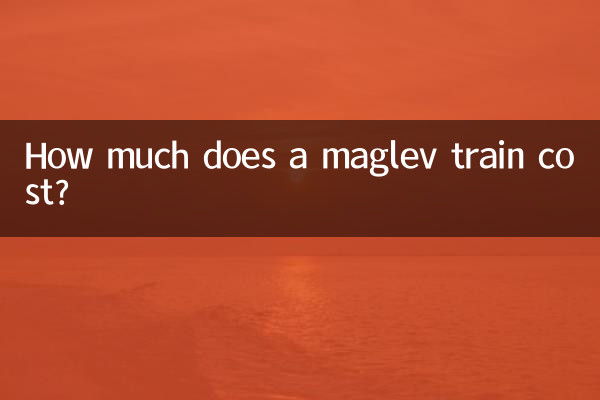How much does a maglev train cost?
As a representative of modern high-tech transportation, maglev trains have always attracted much attention. In recent years, with the continuous advancement of technology and the promotion of applications, the cost and operating cost of maglev trains have become a hot topic. This article will give you a detailed analysis of the price and related data of maglev trains based on the hot content on the entire network in the past 10 days.
1. Cost of Maglev Train

The cost of maglev trains varies greatly depending on factors such as technology, line length, and region. The following are the cost data of several typical projects mentioned in recent hot discussions:
| Project name | Line length | total cost | Unit cost (100 million yuan/km) |
|---|---|---|---|
| Shanghai Maglev Demonstration Line | 30.5 kilometers | 8.9 billion yuan | 2.92 |
| Changsha Maglev Express | 18.55 kilometers | 4.29 billion yuan | 2.31 |
| Japan Chuo Shinkansen (under construction) | 286 kilometers | About 9 trillion yen | About 2.2 |
2. Fare situation
The price of maglev trains is also a focus of public concern. The following is fare information for several maglev lines in operation:
| Line name | Full fare | Average fare per kilometer |
|---|---|---|
| Shanghai Maglev | 50 yuan (ordinary ticket) | 1.64 yuan/km |
| Changsha Maglev Express | 20 yuan | 1.08 yuan/km |
| Japan Yamanashi test line | 3000 yen | About 20 yuan/km |
3. Operating cost analysis
The operating costs of maglev trains mainly include energy consumption, maintenance costs, labor costs, etc. According to recent industry reports, the main data are as follows:
| cost item | Shanghai Maglev | Changsha Maglev Express |
|---|---|---|
| annual operating costs | About 250 million yuan | About 120 million yuan |
| Energy cost share | 35% | 30% |
| Maintenance cost ratio | 40% | 45% |
4. Future development prospects
The recently hotly discussed development trend of maglev technology shows that the cost of maglev trains is expected to decrease in the future. The main reasons include:
1. Large-scale production will reduce manufacturing costs
2. Technological progress has improved energy efficiency
3. Increased localization rate reduces import dependence
4. Accumulation of operational experience optimizes maintenance plans
Experts predict that by 2030, the unit cost of maglev trains is expected to drop to 150-200 million yuan/km, which will greatly enhance its economics and promotion value.
5. Hot spots of public concern
According to the analysis of online public opinion in the past 10 days, the public’s main concerns about maglev trains include:
| focus | Discussion popularity |
|---|---|
| Is the fare reasonable? | high |
| security | high |
| noise pollution | in |
| construction cycle | in |
| Economic benefits | high |
6. Conclusion
Taken together, the cost and ticket price of maglev trains are still at a relatively high level, but with technological advancement and economies of scale, the cost is expected to be significantly reduced in the future. As a green and efficient means of transportation, maglev trains have unique advantages in specific scenarios and deserve continued attention and development.
The data in this article come from recent hot Internet discussions and public reports and are for reference only. Actual project costs and ticket prices may vary based on specific conditions.

check the details

check the details